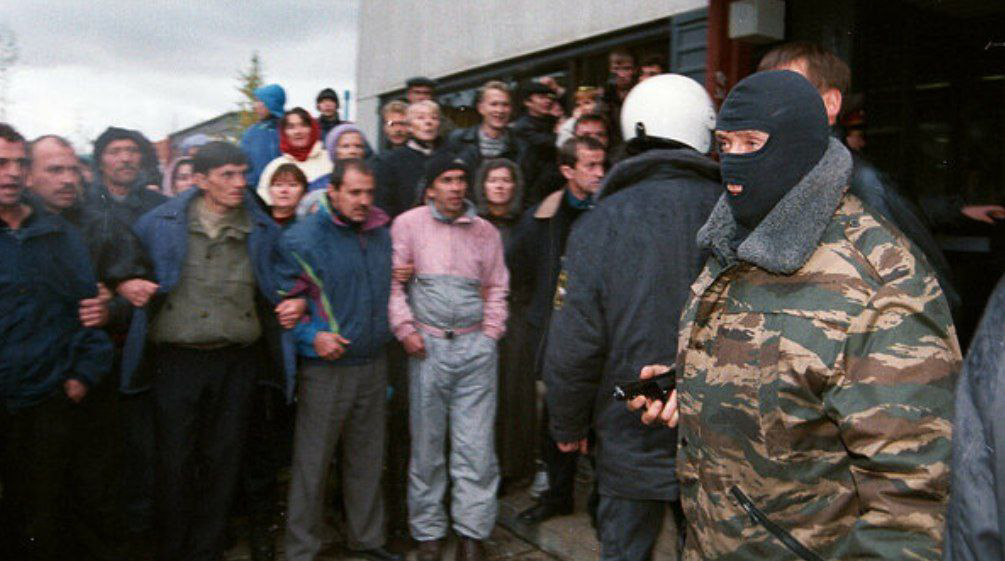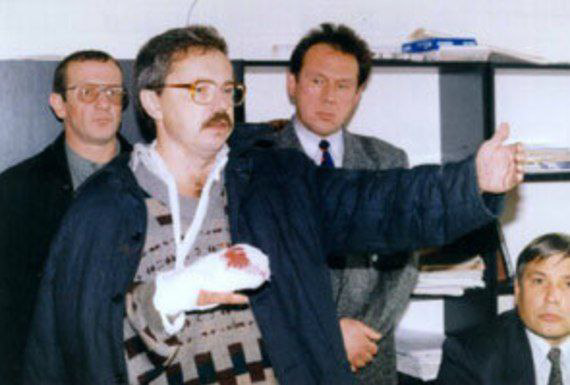
Our translation of the Antijob project article.
Not so long ago we wrote about the occupation of mills and factories in Argentine, but as our subscribers rightly noted something similar, but unfortunately on a smaller scale and with its own specifics, had happened in Russia’s modern history as well.
In the late 1990s, there were several workers’ attempts to take the control of their enterprises in various degrees of success. We will tell you the story of the most successful of them, Vyborg’s pulp and paper mill, and try to compare it to the story of Argentinian workers’ occupation of the ceramic factory Zanon.
So, Vyborg’s Pulp and Paper Mill (PPM) is an enterprise that is located in the village Sovetski near Vyborg. At the end of the 90s there were more than 2000 workers and in fact it was the city-forming enterprise. It was hardly to find any other job. In the 90s the enterprise was privatized and through a simple scheme with contractor firms, that were supplying raw materials at inflated prices and buying the products at low prices, it was led to bankruptcy. The beneficiaries of this whole process were obviously the owners of the enterprise. They were outrageously pursuing a simple goal – to pump funds into their pockets and then disappear, as if they never existed.
Back then, there were numerous similar stories – capitalists preferred to play short, hit the jackpot and move on to some new goals. On the other side workers were left without salaries for months, even years and later without a job since the bankrupted enterprise would close and its assets, including the expensive equipment, would be sold off. That would have been the same case here as well, but it followed in a different way.
“Optimization” in the style of the 90s
The owners of the new firm “Nimonor Investments”, that bought Vyborg’s PPM, wanted to reorganise it into sawmill, firing that way a half of the working collective. They replaced mill’s security with their own and obviously later they could easily start the selling off of the “unnecessary” assets, but mill’s collective formed people’s squad, witch would guard the enterprise alongside owners’ security. Then, as people weren’t receiving salaries for moths, they organized a general assembly and established a trade union comprised of workers and local municipal deputies. We believe they, should be mentioned separately.
Undoubtedly, as it is now, there was a lot of deputies who were businessmen themselves or were representing the interest of a business. But then the notorious vertical power system was not build yet, the elections were not completely reduced to a sham and therefore among the deputies people not integrated in the system could be found and they were ready, one way or the other, to fight against it. That was the case of some of the municipal deputies. In a certain sense, the existence of such people was good. It’s quite likely (but it is not sure) that workers wouldn’t be able to fight the owners without them so successful. But here the huge contrast with the situation of the occupied Argentinian factory becomes evident. In Argentina the workers put forward leaders from their own stuff and even if there were external activists who helped them, firstly they were not deputies, and secondly, the main organizational work was carried out by the workers themselves. And even more important, the practice of regular workers’ assemblies for solving production and management issues was introduced in most of the occupied enterprises. There was nothing similar at Vyborg’s PPM. Unfortunately, the tendency of reling on people in power had proven to be very persistent in Russia. As we will see later, that would end workers’ good beginnings.
So, the union started to work. It tried to force the authorities to solve the problem of workers’ lack of livelihood, to force, again thought the authorities, the owner to enterprise to follow the contract under which he had acquired the PPM, namely, not to re-profile it and to keep all the jobs. When it became clear that that was useless, the trade union committee gathered a general conference of workers on which they decided to start the production independently without the owner. The conference elected new management and decided to register the mill under a new form of ownership – as belonging to its labour collective (CJSC “Vyborg PPM”). Tax authorities refused to do so, but workers threatened to block the “Scandinavia” motorway that connects Russia with Finland.

“Tayfun” special forces on mill’s territory
The struggle and the results
On a day when people came out to block the motorway, the issue was resolved in less than ten minutes. The company was registered and then the work team with the newly elected management started production at Vyborg Pulp and Paper Mill against the will of its formal owners. Further in such a form the mill worked for a little less than 2 years (from 6 March 1998 to 18 January 2000). There were several unsuccessful attempts of its raider seizure by the new "owners" (Nimonor Investments sold the pulp and paper mill to Alexander Sabodazh). On the second attempt, the enterprise was taken by Typhoon Special Forces. The workers stormed the factory and forced the raiders to leave. Meanwhile, they were shot at and several of workers were wounded. They were already talking about buying weapons and organising the defence of the enterprise, but after the first failures the new owner began to act more cunningly.

Locksmith Aleksandr Ogurtsov got a bullet wound of the right hand
When he realised that he could not get his way by force, he organised an economic blockade with the support of the authorities. All contracts with the pulp and paper mill were blocked, transport was not allowed there. This caused more wage delays. The head of the Vyborg Legislative Assembly Rubinovich, who had previously supported the workers, and the head of the trade union committee Kiryakov, who was associated with him, defected to the side of the new "masters". In the end it ended up being a trivial bribe. The new owner started to pay workers 1000-1500 roubles each to sign an application form for transferring from CJSC "Vyborg Pulp and Paper Mill" to his own company, and very soon there were more than a half of the total number of workers.
As we can see, the reliance on MPs has failed the workers. Once those were overbought - the everything fall apart. Like Sabodage, but on a nationwide scale, Putin has bribed the Russian working class with "stability" and as a result recent studies show that now the main form of its struggle is petitions to the government.
Well, and what about Argentine? The Zanon (now FaSinPat) ceramics factory is still under workers' control. Its occupation gave birth to a whole movement of workers’ self-organization on various enterprises. Because of this, in Argentina we see the struggle of labour and capital. And its outcome is still not predetermined. Meanwhile in our case, to put it mildly, it is quite different. However, nothing prevents us from learning form the lessons of the past and not entrusting our destiny to others. We are confident that sooner or later the Russian working class will have a chance to correct this mistake. It is important not to overlook it and again not to delegate the fight for your rights and interests to someone else.
We need your support.

Add new comment